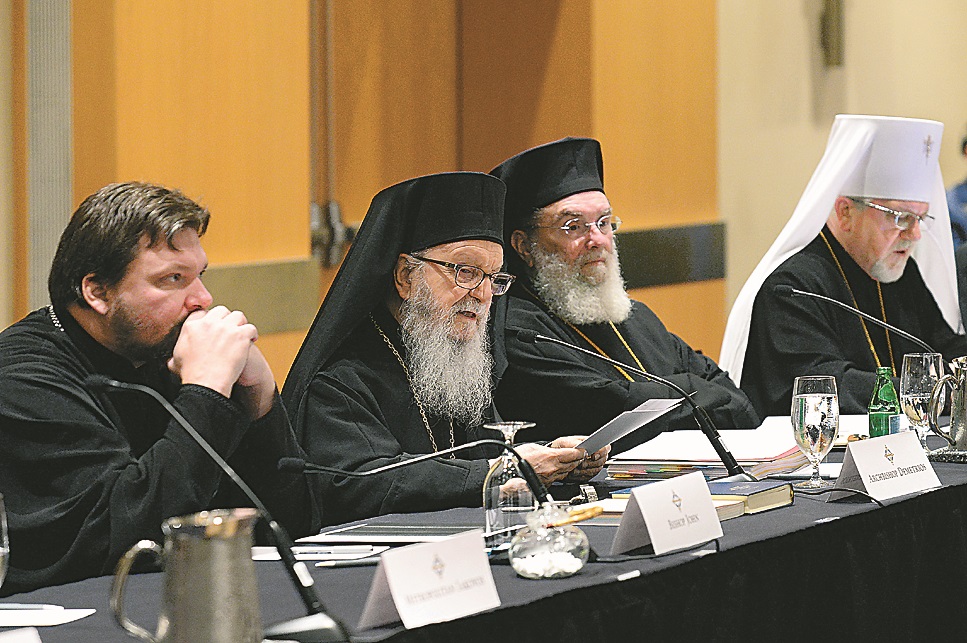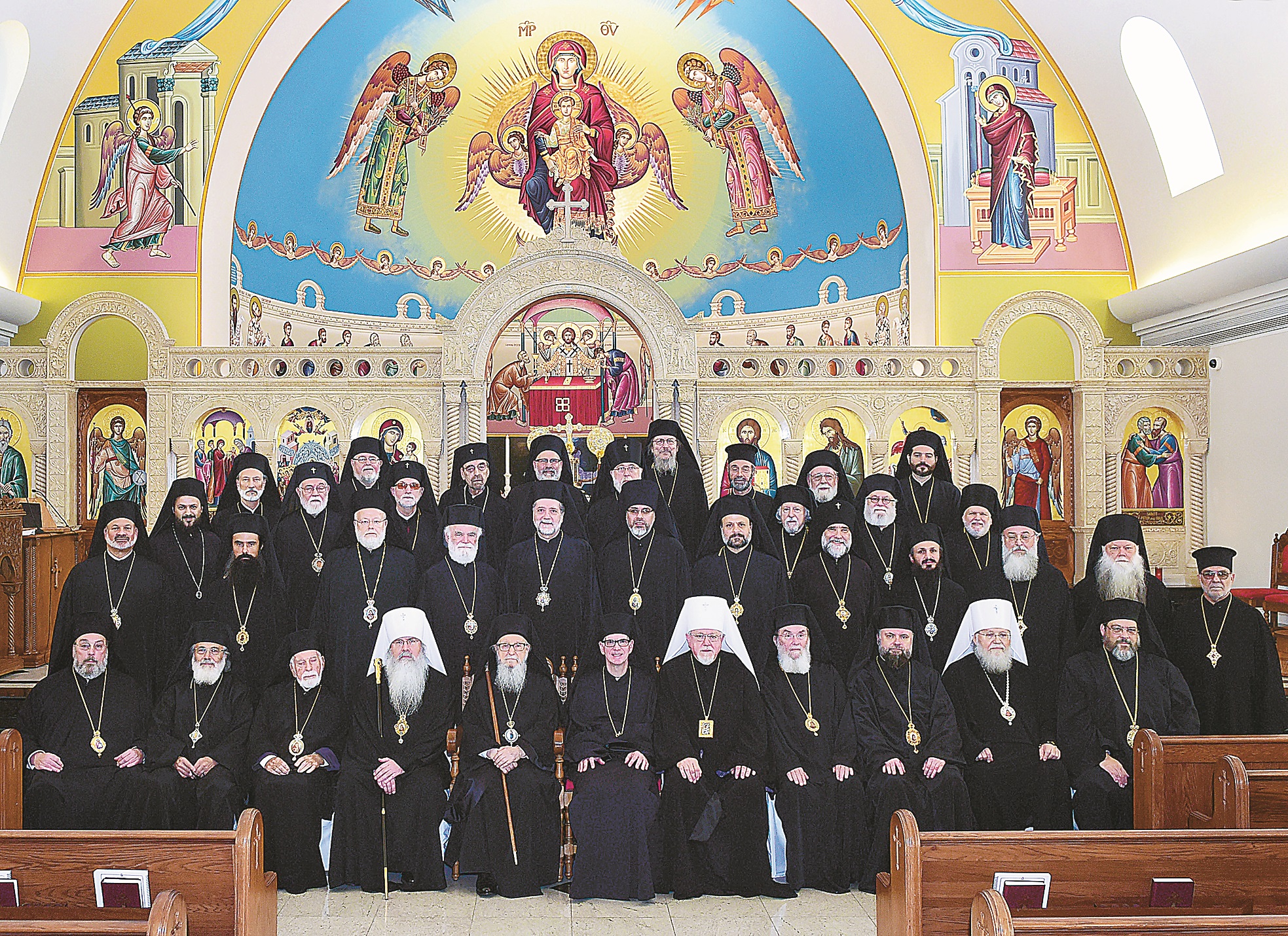DETROIT – The Assembly of Canonical Orthodox Bishops of the United States of America convened their 7th Annual General Assembly Meeting in Detroit on Oct. 4, 2016 with the celebration of the Divine Liturgy at the Antiochian Basilica of St. Mary in Livonia, Mich.
The bishops commenced their work with an opening address by the Assembly Chairman, Archbishop Demetrios, who greeted and welcomed the hierarchs, encouraging them that “…when we speak together as an Assembly of Bishops, we do so with the authority of the Church; we do not speak as jurisdictions or merely as representatives, but as a single body of Orthodox Hierarchs who are committed to sharing the transformative light of Christ with our local society.”
His Eminence began his remarks with an expression of gratitude and with reflections on the Holy and Great Council which met in June of this year in Crete, crowning 55 years of preparation.
The Archbishop noted that 12 of the Assembly’s bishops participated in the productive conciliar work and discussions of the Council, which “…helped us gain a better perception of who we are and…of the need to consistently strive for unity.”
Emphasizing the importance of our local Assembly, the Chairman stated, “… we must search for ways to align our local diocesan work with the work of the Assembly, and it is obvious that our committees may assist us.”
The first working session of the day commenced with the participation of 41 hierarchs of the Church. In brotherly love, and with responsibility and hopes for a fruitful meeting, the bishops approved the minutes of the 2015 General Assembly meeting, the agenda of their present work, and the financial report from the treasurer. The bishops also heard the reports of the work of the Assembly Secretariat and Committees.
A substantial amount of time during the day was dedicated to hearing and discussing the reports from five of the Assembly agencies.

Fr. Steven Powley, executive director of Orthodox Christian Prison Ministry (OCPM), presented a new promotional video that describes the work of this ministry in fulfilling the call to minister to those in prisons through thousands of personal letters written to prisoners, as well as the distribution of Bibles and books, icons, pamphlets and spiritual works.
Dean Triantafilou, executive director of the International Orthodox Christian Charities (IOCC)—the humanitarian arm of the Assembly of Bishops—shared details on IOCC’s work since its inception. IOCC has delivered nearly $600 million of assistance worldwide in some 50 countries during its 25-year existence.
In 2015, IOCC provided program services of $55 million. This year to date, IOCC has provided program services of $21 million and looks forward to celebrating its 25th anniversary.
Fr. Martin Ritsi, executive director of the Orthodox Christian Mission Center (OCMC), reported on the ministry which focuses on evangelization and re-evangelization of people.
In 2015, 29 people served as OCMC missionaries whose assignments in six countries involved catechism, theological and seminary teaching, youth work, primary and secondary teaching, counseling, translations and various outreach ministries. Fr. Martin also described the SAMP (Support-a-Mission-Priest) program, which continues to subsidize the support of almost 400 clergymen in 16 countries. OCMC currently contributes to theological training and mission projects in the over 30 countries.
Fr. Gregory Joyce, board member, Charles Lelon, vice chairman, and Eleni Alexiou, managing director of Orthodox Christian Network (OCN), each highlighted details of this effective media witness around the world. OCN now offers a suite of Orthodox mobile apps, which, along with other multimedia methods, now reaches as many as 5.7 million people per week.
James Giannakis, of Orthodox Christian Fellowship (OCF), presented ways OCF strives to be the loving presence of Christ and the Orthodox Church on college campuses.
OCF is an integral part of students’ spiritual formation and challenges them to explore and to life their Faith on a daily basis. OCF currently has more than 320 campus chapters throughout the country.
The first day’s work concluded with a meaningful discussion and some clarification on the Assembly’s mandate following the Council in Crete. Following this discussion, the Hierarchs recommitted to their common work as members of the Assembly of Canonical Bishops of the United States.
Visit http://assemblyofbishops.org/news/2016/assembly-detroit-gather for more information.
The Assembly of Canonical Orthodox Bishops of the United States began the second day of its annual meeting on Oct. 5 with a special forum dedicated to the important subject of religious freedom. Three highly accomplished scholars presented:
Dr. Charles Haynes, director of the Religious Freedom Center and vice president of the Newseum Institute, delivered an overview of the First Amendment to the United States Constitution and its central role in protecting the free exercise of one’s faith in America’s public square.
He encouraged the hierarchs to study how Orthodox Christianity is presented in the public square, especially in the textbooks of our nation’s public schools, and shared his hope that seminarians be educated in the area of religious freedom.
Dr. Debra Mason, professor of Journalism Studies at the University of Missouri School of Journalism and Curriculum Specialist at the Religious Freedom Center, presented on the subject of religion in the media. She highlighted the unique challenges facing the church in utilizing digital media platforms to reach the faithful, especially millennials.
Dr. Elizabeth Prodromou, visiting associate professor of Conflict Resolution at the Fletcher School of Diplomacy at Tufts University, delivered a presentation on the international status of religious freedom. Professor Prodromou offered a primer on the deep historical footprint concerning religious freedom, noting the central role of religious freedom in the life of all people.
She called upon the hierarchs to engage the American public as social critics; to mine the theological resources of Orthodoxy to better understand and defend religious freedom; to engage in catechesis with the faithful on this subject; to support religious freedom for all people; to develop partnerships with other religious groups in the propagation of religious freedom; and to stand against totalitarian ideologies wherever they may be found.
With the end of the two three-year terms of service of Bishop Basil and Metropolitan Antony as secretary and treasurer, the Assembly elected Bishop Gregory as Assembly Secretary and Archbishop Michael as Assembly treasurer.
The Assembly spent considerable time reviewing the work of its committees and recommended ways to advance their work.
Metropolitan Methodios, Committee on Canonical Affairs chairman, updated the assembly on the effort to establish a common clergy database, which would provide hierarchs immediate access to the ecclesiastical status of every Orthodox clergy across the nation.
Metropolitan Savas, Chair of the Committee on Church and Society, expressed hope that the committee might be more active in the future. His Grace Bishop Demetrios, Chair of the Committee on Ecumenical Affairs, reviewed the ongoing theological consultations and commissions.
Metropolitan Isaiah, chair of the Committee for Military Chaplaincy, reviewed the possibility of designating the Assembly of Bishops as the religious organization to the US Defense Department and as the common Orthodox Christian Endorsing Agency.
Bishop Thomas, Committee for Youth chairman, updated the Assembly on the continued work of the committee and expressed gratitude for the Assembly’s ongoing support of the various youth activities and for once again endorsing the annual Youth Worker and Camping Conference, slated for January 2017.
Archbishop Nicolae, Committee for Canonical Regional Planning chairman, presented a detailed report on the regional study of jurisdictional collaboration in Texas, New Mexico and Oklahoma. The study revealed that grassroots parish collaboration may lead to greater pan-Orthodox unity through the establishment of local parish networks.
These networks may enhance our ability to address common interests, needs and concerns, and may provide opportunities to share ministries and resources.
For more information, visit: http://assemblyofbishops.org/news/2016/assembly-detroit-religious-liberty-committeespanorthodox-cooperation

